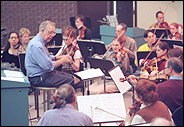Doctors in tune
 I Medici di McGill at a recent practice
I Medici di McGill at a recent practicePHOTO: Owen Egan |
|
The McIntyre Medical Sciences Building is usually quiet at seven in the evening. Just the odd janitor, security guard, or industrious student.
On Monday evening, however, the disorganized but tuneful sounds of an orchestra warming up can be heard from the fifth floor.
Inside the lecture hall, a collection of about 40 professors, students and researchers, almost all from the Faculty of Medicine, are plucking violin strings, adjusting the reeds of clarinets and rattling snare drums. The group is called I Medici di McGill, and they have been playing together for about 11 years.
"Our goals are to present medical activities in a different light and to contribute to some good deeds," says pharmacology and therapeutics professor Ante Padjen, founder of the ensemble.
Funded by a combination of donations, sponsors and membership dues, I Medici di McGill has performed more than 70 concerts and has attracted more than 150 members since its inception. Even though they are out of their lab coats, much of what these amateur musicians do is still therapeutic in nature.
"One of the biggest things we have been doing ... has been playing for hospitalized patients or senior citizens. We also have an annual benefit concert for a student exchange," says Padjen. Last year the orchestra raised $6,000 that helped dozens of students travel to Armenia and Croatia.
Padjen himself is a native of Croatia where, as a child, he played viola and continued in university in a medical students' ensemble. When he arrived in Montreal 25 years ago, however, he couldn't find an ensemble to play in.
He finally founded his own with the help of professional conductor Wanda Caluzny, who stayed with the ensemble until last year.
The new conductor is music professor Iwan Edwards, a man well known to Montreal music aficionados as a conductor of vocal ensembles, including the Montreal Symphony Orchestra Chorus, the St. Lawrence Choir, and McGill's own vocal and orchestral ensembles.
"Most of my professional life is spent with choirs, but my early training was with violin and I missed that aspect of my work," says Edwards, explaining why he agreed to work with I Medici.
"I'm there to build an ensemble without putting unreasonable demands on their time or abilities," says Edwards. "The intent is to cover as wide a range of musical styles as possible."
Padjen readily admits making rehearsals can sometimes be difficult for busy doctors and medical students, but there is almost always a respectable number of musicians every Monday. Indeed, he has never had a problem recruiting enough musicians to fill his roster each year. In fact, many are doing "double duty," participating in the full ensemble as well as in smaller string and wind quartets.
"It is an interesting thing to study. Maybe it is that people who go into medicine are interested in many things and can handle a variety of things," muses Padjen.
Part of the explanation, he suspects, is that most members don't see the practice as a chore -- as some may remember from seemingly endless violin or piano lessons -- but as a break.
"There is something about playing music, to be able to let go of whatever classes, or patients, or research grants that you're thinking about, that is very soothing," says medical student Astrid Christoffersen-Deb.
The fourth-year student has been playing violin since she was five years old. She joined I Medici after the ensemble performed at a fundraising event for a group of students she was involved with who were traveling to Croatia to do humanitarian work.
"To see physicians outside of their traditional role is always positive. It reminds us that we have other talents, that we have other potentials outside of medicine. It's a different way of communication," says Christoffersen-Deb, a recent Rhodes Scholar, who will leave the orchestra next year when she moves to Oxford.
Despite all the energy put into rehearsals, recruiting and touring, I Medici is not just about the concerts. There is an academic component, as I Medici's annual performances feature a short seminar on music in medicine.
"That's something that is one of our trademarks. Because of our double heritage many of us are interested in exploring these kinds of links. The topics range from such things as music as the language of the brain, medicated music, and we're very keen on establishing the biology of music," says Padjen.
I Medici's next concert will be on April 2 at 8 pm at Christ Church Cathedral, at University and Ste. Catherine. The program will feature works by Beethoven, Grieg, Gounod and Brahms. For further information about I Medici, please see www.imedici.mcgill.ca. An earlier version of this article appeared in The Medical Post.

